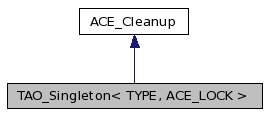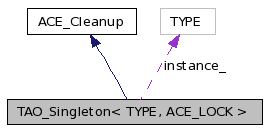
#include <TAO_Singleton.h>
Inheritance diagram for TAO_Singleton< TYPE, ACE_LOCK >:


Public Member Functions | |
| virtual void | cleanup (void *param=0) |
Static Public Member Functions | |
| static TYPE * | instance (void) |
| Global access point to the Singleton. | |
| static void | dump (void) |
| Dump the state of the object. | |
Protected Member Functions | |
| TAO_Singleton (void) | |
| Default constructor. | |
Static Protected Member Functions | |
| static TAO_Singleton< TYPE, ACE_LOCK > *& | instance_i (void) |
| Get pointer to the TAO Singleton instance. | |
Protected Attributes | |
| TYPE | instance_ |
| Contained instance. | |
Static Protected Attributes | |
| static TAO_Singleton< TYPE, ACE_LOCK > * | singleton_ = 0 |
| Pointer to the Singleton (ACE_Cleanup) instance. | |
TAO_Singletons are used by TAO to register TAO-specific singleton instances with the TAO_Object_Manager. This ensures that TAO singletons are isolated from ACE's Object_Manager, thus allowing TAO to be safely dynamically unloaded.
Definition at line 47 of file TAO_Singleton.h.
| TAO_BEGIN_VERSIONED_NAMESPACE_DECL ACE_INLINE TAO_Singleton< TYPE, ACE_LOCK >::TAO_Singleton | ( | void | ) | [protected] |
| void TAO_Singleton< TYPE, ACE_LOCK >::cleanup | ( | void * | param = 0 |
) | [virtual] |
Cleanup method, used by <ace_cleanup_destroyer> to destroy the singleton.
Reimplemented from ACE_Cleanup.
Definition at line 105 of file TAO_Singleton.cpp.
References TAO_Singleton< TYPE, ACE_LOCK >::instance_i().
00106 { 00107 delete this; 00108 TAO_Singleton<TYPE, ACE_LOCK>::instance_i () = 0; 00109 }
| TAO_BEGIN_VERSIONED_NAMESPACE_DECL void TAO_Singleton< TYPE, ACE_LOCK >::dump | ( | void | ) | [static] |
Dump the state of the object.
Definition at line 27 of file TAO_Singleton.cpp.
References ACE_DEBUG, ACE_END_DUMP, ACE_TEXT, ACE_TRACE, and LM_DEBUG.
00028 { 00029 ACE_TRACE ("TAO_Singleton<TYPE, ACE_LOCK>::dump"); 00030 00031 #if !defined (ACE_LACKS_STATIC_DATA_MEMBER_TEMPLATES) 00032 ACE_DEBUG ((LM_DEBUG, ACE_TEXT ("instance_ = %x"), 00033 TAO_Singleton<TYPE, ACE_LOCK>::instance_i ())); 00034 ACE_DEBUG ((LM_DEBUG, ACE_END_DUMP)); 00035 #endif /* ACE_LACKS_STATIC_DATA_MEMBER_TEMPLATES */ 00036 }
| TYPE * TAO_Singleton< TYPE, ACE_LOCK >::instance | ( | void | ) | [static] |
Global access point to the Singleton.
Definition at line 53 of file TAO_Singleton.cpp.
References ACE_GUARD_RETURN, ACE_NEW_RETURN, ACE_TRACE, TAO_Singleton_Manager::at_exit(), TAO_Singleton< TYPE, ACE_LOCK >::instance_, TAO_Singleton< TYPE, ACE_LOCK >::instance_i(), TAO_Singleton_Manager::shutting_down(), and TAO_Singleton_Manager::starting_up().
Referenced by TAO::ORB_Table::instance().
00054 { 00055 ACE_TRACE ("TAO_Singleton<TYPE, ACE_LOCK>::instance"); 00056 00057 TAO_Singleton<TYPE, ACE_LOCK> *&singleton = 00058 TAO_Singleton<TYPE, ACE_LOCK>::instance_i (); 00059 00060 // Perform the Double-Check pattern... 00061 if (singleton == 0) 00062 { 00063 if (TAO_Singleton_Manager::starting_up () || 00064 TAO_Singleton_Manager::shutting_down ()) 00065 { 00066 // The program is still starting up, and therefore assumed 00067 // to be single threaded. There's no need to double-check. 00068 // Or, the TAO_Singleton_Manager instance has been destroyed, 00069 // so the preallocated lock is not available. Either way, 00070 // don't register for destruction with the 00071 // TAO_Singleton_Manager: we'll have to leak this instance. 00072 00073 ACE_NEW_RETURN (singleton, (TAO_Singleton<TYPE, ACE_LOCK>), 0); 00074 } 00075 else 00076 { 00077 #if defined (ACE_MT_SAFE) && (ACE_MT_SAFE != 0) 00078 // Obtain a lock from the ACE_Object_Manager. The pointer 00079 // is static, so we only obtain one per TAO_Singleton 00080 // instantiation. 00081 static ACE_LOCK *lock = 0; 00082 if (ACE_Object_Manager::get_singleton_lock (lock) != 0) 00083 // Failed to acquire the lock! 00084 return 0; 00085 00086 ACE_GUARD_RETURN (ACE_LOCK, ace_mon, *lock, 0); 00087 00088 if (singleton == 0) 00089 { 00090 #endif /* ACE_MT_SAFE */ 00091 ACE_NEW_RETURN (singleton, (TAO_Singleton<TYPE, ACE_LOCK>), 0); 00092 00093 // Register for destruction with TAO_Singleton_Manager. 00094 TAO_Singleton_Manager::at_exit (singleton); 00095 #if defined (ACE_MT_SAFE) && (ACE_MT_SAFE != 0) 00096 } 00097 #endif /* ACE_MT_SAFE */ 00098 } 00099 } 00100 00101 return &singleton->instance_; 00102 }
| TAO_Singleton< TYPE, ACE_LOCK > *& TAO_Singleton< TYPE, ACE_LOCK >::instance_i | ( | void | ) | [static, protected] |
Get pointer to the TAO Singleton instance.
Definition at line 39 of file TAO_Singleton.cpp.
References TAO_Singleton< TYPE, ACE_LOCK >::singleton_.
Referenced by TAO_Singleton< TYPE, ACE_LOCK >::cleanup(), and TAO_Singleton< TYPE, ACE_LOCK >::instance().
00040 { 00041 #if defined (ACE_LACKS_STATIC_DATA_MEMBER_TEMPLATES) 00042 // Pointer to the Singleton instance. This works around a bug with 00043 // G++ and it's (mis-)handling of templates and statics... 00044 static TAO_Singleton<TYPE, ACE_LOCK> *singleton_ = 0; 00045 00046 return singleton_; 00047 #else 00048 return TAO_Singleton<TYPE, ACE_LOCK>::singleton_; 00049 #endif /* ACE_LACKS_STATIC_DATA_MEMBER_TEMPLATES */ 00050 }
TYPE TAO_Singleton< TYPE, ACE_LOCK >::instance_ [protected] |
Contained instance.
Definition at line 66 of file TAO_Singleton.h.
Referenced by TAO_Singleton< TYPE, ACE_LOCK >::instance().
TAO_Singleton< TYPE, ACE_LOCK > * TAO_Singleton< TYPE, ACE_LOCK >::singleton_ = 0 [static, protected] |
Pointer to the Singleton (ACE_Cleanup) instance.
Definition at line 70 of file TAO_Singleton.h.
Referenced by TAO_Singleton< TYPE, ACE_LOCK >::instance_i().
 1.4.7
1.4.7